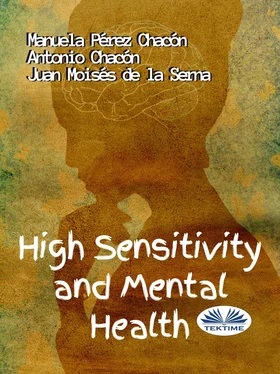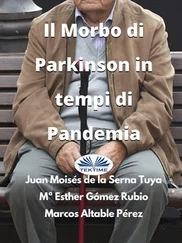Perceiving sensations as an HSP is similar to feeling both ends of a stimulus. They are affected by a very loud noise or will notice one that is very quiet. They enjoy intense flavors or will detect a mild ingredient added to a recipe. What each person is most sensitive to will vary from one HSP to another. Some show their sensitivity to tastes, others to sounds, light, smells, or textures. But they all have extreme and obvious sensitivity.
The difference between HSP and non-HSP people lies in the tastes or interests they present. Non-HSP people differ from HSP people in that they choose their interests or tastes, whether they prefer a type of food or a type of music. On the other hand, the HSP possesses a need that is superior to interest or taste, it is something innate that is not determined by the simple fact of taste itself. We could say that there is a biological force that drives the HSP to perceive and be able to feel both sides of the coin, so to speak. Many of the complaints are about feeling too hot or too cold. There seems to be no middle ground. Sometimes they require being surrounded by a lot of people and sometimes they require solitude. This incongruence in various situations generates a certain discord with the people with whom they live.
On the positive side, a highly sensitive person enjoys the details of life. They show it through the sensation that various particularities produce in them, such as a deep conversation, watching a sunrise, or visiting a museum. In personal relationships, love and friendship take on a higher meaning. At the same time, they enjoy the privacy they get in those moments when they are alone, where they can give free rein to their creativity. Many of them are good at drawing, dancing, or cooking, others have the intelligence to make good decisions or to help others. There are many different aspects in which the highly sensitive person stands out thanks to their creativity and emotionality.
Regarding the notion of time, the HSP requires time alone to disconnect from their routine. Especially after experiencing times of high stimulation, their body asks for a space of relaxation, silence, and tranquility.
The emotions of a highly sensitive person are characterized by their flexibility to be triggered by stimulating situations. The existence of experiences that generate extreme emotions is a determining factor for the HSP. They are capable of enjoying the good to a fuller extent, but also of suffering much when experiencing that which hurts.
The nervous system of the HSP, acting in a predetermined way, reacts when stimulated by the emotions generated by what happens in their surroundings. The limbic system is the part of the brain responsible for producing emotions, generating neurochemical and hormonal responses. In this way, the emotion is associated with the experience. Emotion is an unconscious, basic, primitive impulse. However, when emotions associated with similar experiences are repeated, the person begins to give it a concrete value by forming a feeling towards it. The HSP externalizes these feelings through a fine and subtle sensitivity.
In addition to feeling deeply, the highly sensitive person thinks and acts as a reflective whole. Without noticing that they do so, they process information by reflecting before acting through detailed observation of stimuli. In the same way, they can pick up on hidden messages from other people, to notice signals that are transmitted without the need to say anything, thanks to their empathy. Dr. Bianca Acevedo (2014) has studied the part of the brain responsible for stimulating mirror neurons, which are responsible for the existence of empathy. A higher incidence of this type of neuron has been found in highly sensitive people. In this sense, the HSP has that innate ability to be able to put themselves in other people’s shoes and know what the other person is feeling. On the other hand, having such capacity does not necessarily imply having the intention to act on it.
IRENA 5 YEARS OLD
When Irena’s mother decided to go to the psychologist’s office, she had been putting up with comments at family meals and gatherings with friends for years. With the best intentions, grandparents, aunts, uncles, sisters-in-law, and friends showed their interest in Irena’s psychological health. Instead of thinking that there was nothing wrong with her, it was rather they who were neglecting recognizing diversity in personality. The phrases were repeated every weekend: “What does her pediatrician say?” “At her age, she should be eating everything, as my children do.” “Does she have friends at school? She seems so quiet.” “Has she been tested to see if she is gifted, hyperactive, or is there something wrong with her? She doesn’t look happy.” “Does she have to cry about everything?” “When she grows up, who will defend her?” “Does she always have to refuse everything? All the children are playing except her.”
Irena’s mother was very uncomfortable with such comments. At the same time, she knew that her daughter possessed at least average intelligence. She was also an affectionate, cheerful, happy, and sensitive child. Her mother had observed similar behavior in some of the girls at her school, which gave her peace of mind. That’s why she was slow to go to a psychologist’s office, to avoid having her daughter labeled because her intuition told her that Irena simply felt and behaved differently from her cousins and her friends’ children. When she finally sought professional help, it was confirmed that there was no disorder. After some time, she found on the web, by chance, that there were HSC, highly sensitive children, thus unmasking the mystery of why Irena acted and sensed life in her own way.
JANE 38 YEARS OLD
Jane had spent her whole life trying to please the people around her, even if it meant discomfort for herself despite her growing awareness that she was losing more and more self-esteem because of her attitude. As a child, she was obedient, unable to say what she thought so as not to hurt her parents’ feelings. As a teenager, she didn’t have her own criteria. She let herself be “crushed”, as she said, especially by her mother, who constantly manipulated her to mold her into the daughter she had designed. Her youth was filled with social problems with friends as she could not make her own decisions, she had not learned to do so. This also led to relationship problems, Jane was so empathetic that she gave everything without asking for anything in return, letting her fear of failure get the better of her.
The most traumatic experience Jane recounted was living with a partner who acted as if the world revolved around him and who had an exaggerated sense of his importance and entitlement. In therapy she discovered that her partner was narcissistic, a person who had to be the center of attention at all times and who needed continuous praise. A person whom she needed to praise constantly to have his approval and who would punish her if she didn’t comply with his wishes.
Like most people, Jane thought she was different and that this was her lot in life. Two factors overlapped, being a highly empathetic person and her old-fashioned upbringing, that is, growing up hearing phrases such as: “Turn the other cheek.” Or, “You’re much prettier when you’re quiet.” Or, “Don’t do to others what you don’t want them to do to you.”
In treatment, the starting point was Jane’s recognition of the four highly sensitive person’s trait factors. Secondly, they worked on social skills, especially assertiveness, and also improved her self-esteem. The patient learned to detect people who did not make her feel good and to defend herself against them. The fact that she had hit rock bottom in her relationship was also her salvation, as she sought professional help and realized that she should not allow another person to manipulate her, that she should not expect a narcissist to respect her sensitivity, nor should she have to continually praise him to get the slightest thing from him. Jane shook off her fear of failure, feeling proud to be herself and to be able to choose who she wants to share something with and what decisions to make. Now she is not afraid. She is not even afraid to make mistakes, as she prefers to make her own mistakes and learn from them rather than to not be herself.
Читать дальше












